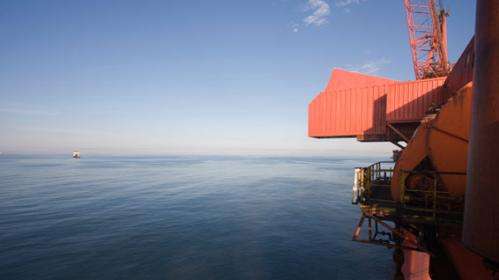Scientists unlocking oil reserves in the North Sea

Heriot-Watt researchers are a step closer to maximising oil reserves from the North Sea by developing methods that can more cleanly and cheaply extract valuable remaining oil from existing fields.
The Centre for Enhanced Oil Recovery within the Institute of Petroleum Engineering at Heriot-Watt has been working on new technologies that could add decades to the life span of oil reservoirs in the North Sea and help secure the future of the oil industry in the region.
Director of the Centre, Professor Mehran Sohrabi, said, "At least half of the original oil still remains in the North Sea reservoirs but there are great challenges in extracting it using Enhanced Oil Recovery (EOR) techniques. These include limited platform space and large well spacing, making extraction too expensive to pursue. Following years of research at the University we now believe we can overcome these challenges."
The Centre has been researching low-salinity water injection which is an innovative area of research that could be a game changer for the industry.
Professor Sohrabi explains, "Low-salinity water injection is relatively inexpensive and can be economically implemented in the North Sea reservoirs. This system works by reducing the salt levels in sea water which is already injected in reservoirs. It has the potential to make a huge impact on the current output of the North Sea's oil production.
"We have developed a robust method to screen oil reservoirs to identify the ones that would respond positively to low salinity water injection. This allows us to estimate the size of incremental oil recovery which is vital for economic calculations of Enhanced Oil Recovery projects.
"This is a massive leap forward, especially in an off-shore setting. The process is relatively inexpensive meaning the costs for EOR could fall dramatically, while yields could rise. It's also cleaner as you're removing the need for potentially toxic chemicals."
Call for government and industry investment
For reservoirs that have already been flooded with water, the EOR Centre at Heriot-Watt University has been working for the past 17 years on developing improved gas injection technologies. In water flooded reservoirs, gas injection will recover the trapped oil more rapidly compared to low salinity water injection.
Professor Sohrabi says, "Gas injection is a robust process but it is difficult to simulate its performance accurately as it happens under a complex three-phase flow regime. We have developed an algorithm for accurate prediction of gas and water alternating gas injection performance in oil reservoirs.
"After 40 years of production, the North Sea oil reservoirs are now mature and in rapid decline. Urgent action is needed now. The Government and industry must invest in new gas and water technologies, in order to reverse that decline."
Heriot-Watt University has been at the forefront of oil and gas technology and training for almost four decades and the Institute of Petroleum Engineering is one of the world's top hubs of expertise in petroleum research.
Provided by Heriot-Watt University



















